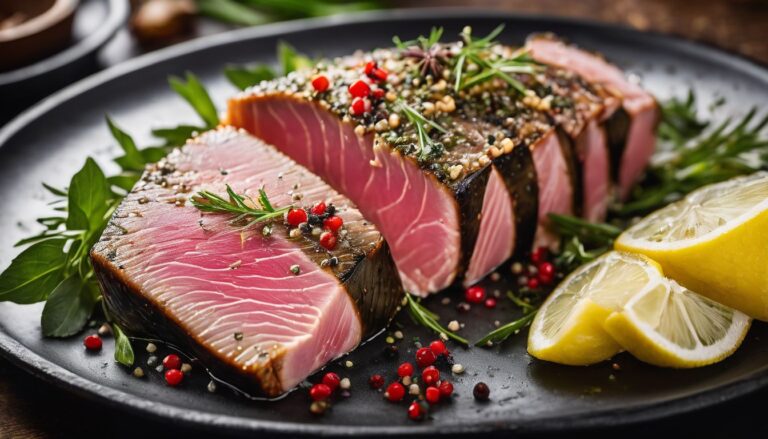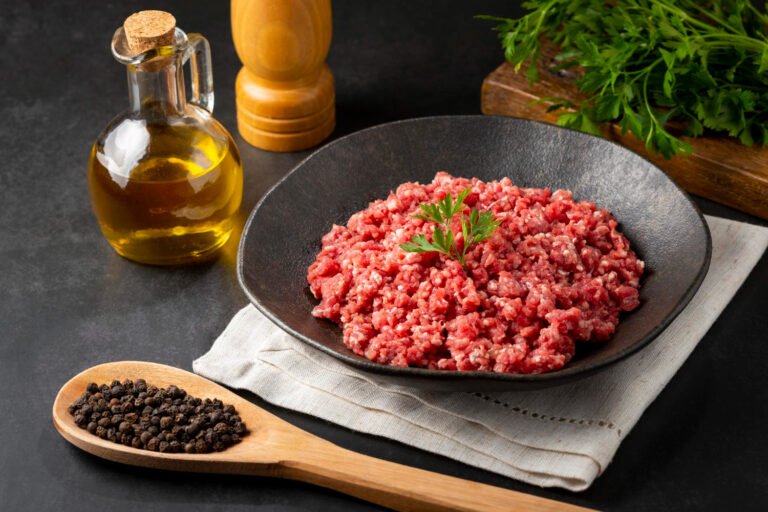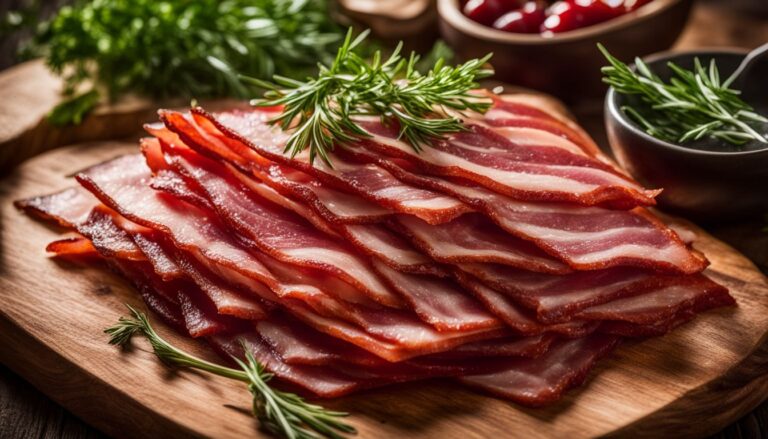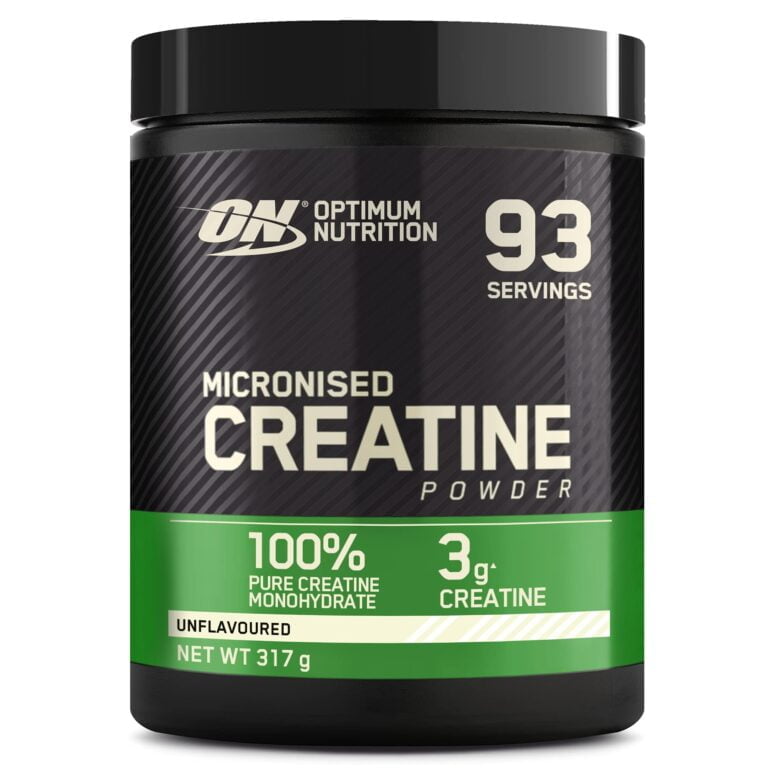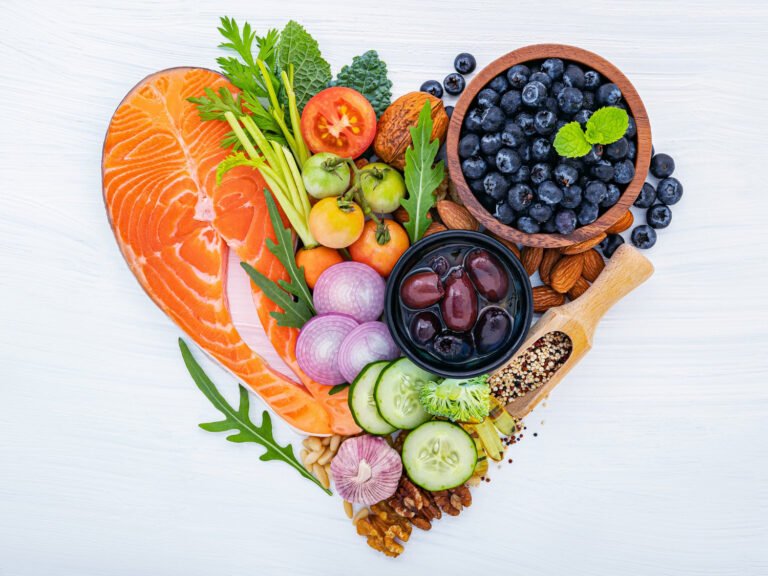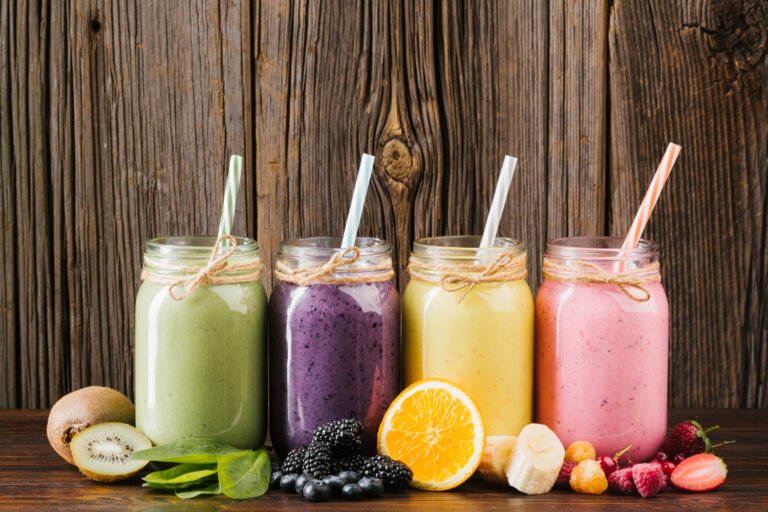Are Black Beans A Good Source Of Protein For A Healthy Diet?
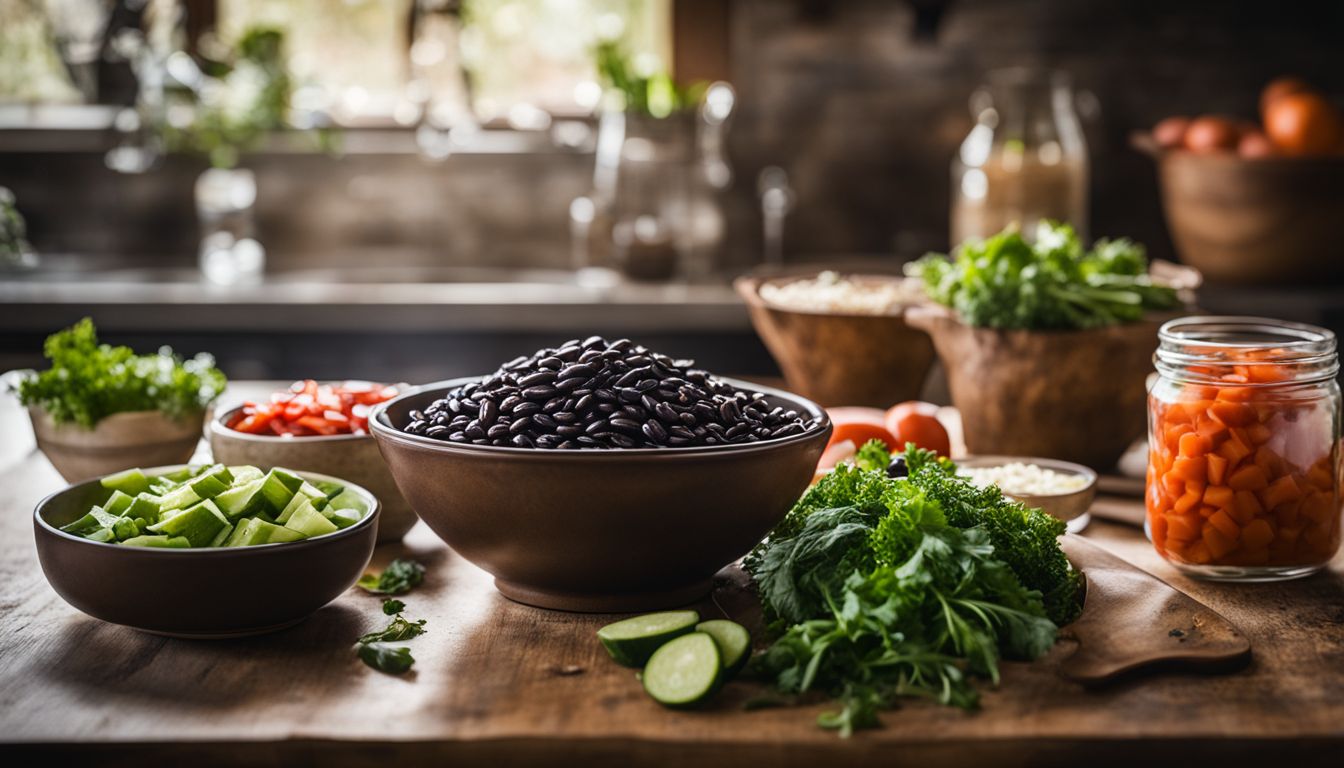
When it comes to building a healthy diet, protein is non-negotiable. Yet the quest for this vital macronutrient often leads to a common misconception: that animal sources are the only path to achieving one’s daily protein needs.
Debunking this myth, black beans emerge as a nutritional powerhouse, offering not just an ample amount of protein but also providing a wealth of additional health benefits. As someone deeply immersed in the field of nutrition and wellness for over a decade, I’ve seen firsthand how incorporating plant-based proteins like black beans can revolutionize eating habits and overall health.
Black beans stand out in the legume family; they pack about 7 grams of protein per serving along with essential vitamins and minerals. This robust profile underscores their value in any balanced diet—especially for those seeking plant-forward options or managing dietary restrictions due to gluten sensitivity or vegan preferences.
Keep reading to uncover why these humble beans might just be your next superfood hero—a small bean promising big gains! Explore with us as we dive into the world of black beans’ nutritional might.
Key Takeaways
- Black beans are an excellent plant-based source of protein, providing about 15 grams per cooked cup, making them a great addition to a balanced diet and suitable for vegans, vegetarians, and meat-eaters.
- With high fiber content and essential vitamins and minerals like iron, magnesium, calcium, vitamin C, and zinc; black beans promote digestive health, support bone strength, boost the immune system, aid in managing blood sugar levels effectively.
- As a valuable protein source for sports training due to their high protein content (15.24 grams per cooked cup) and easily digestible nature; black beans provide sustained energy levels while supporting muscle recovery and growth.
Nutrition of Black Beans
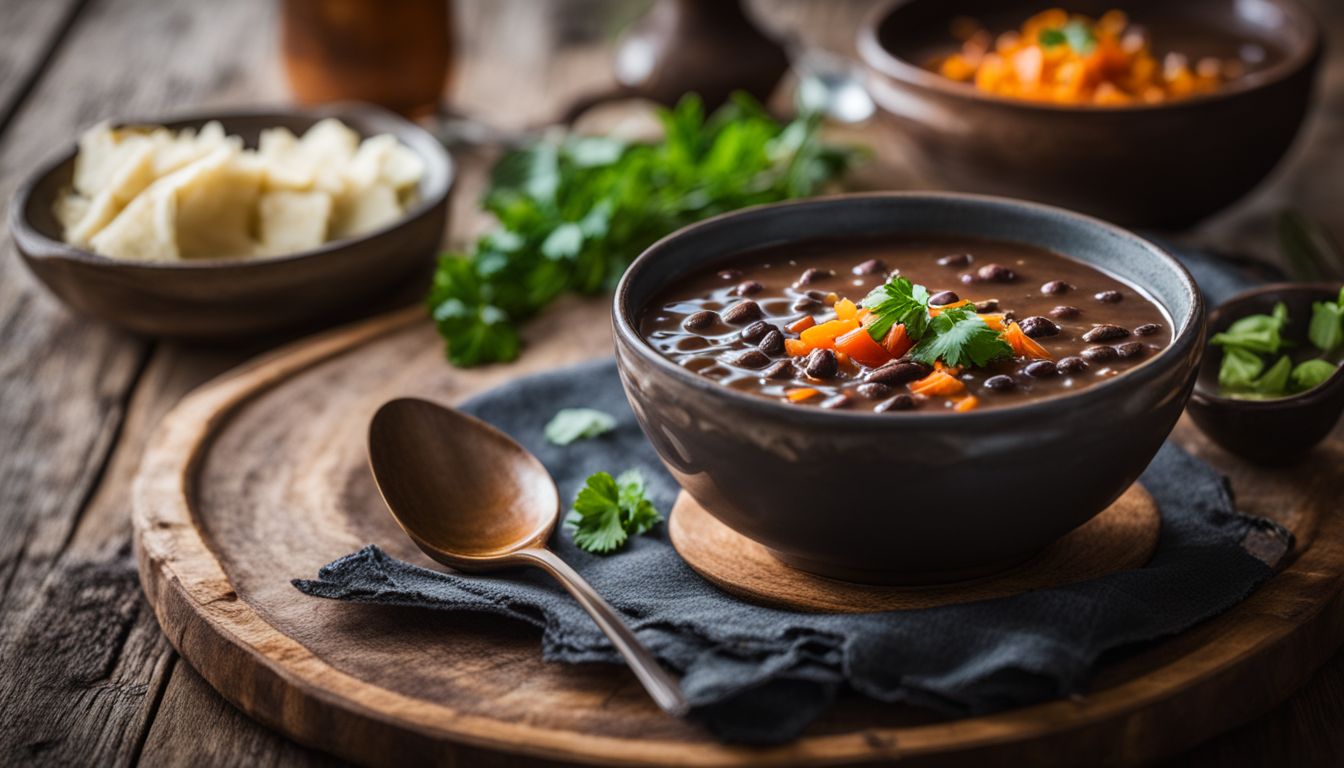
Black beans are a great source of plant-based protein, with about 15 grams per cooked cup, making them an excellent option for those looking to boost their protein intake.
Protein content
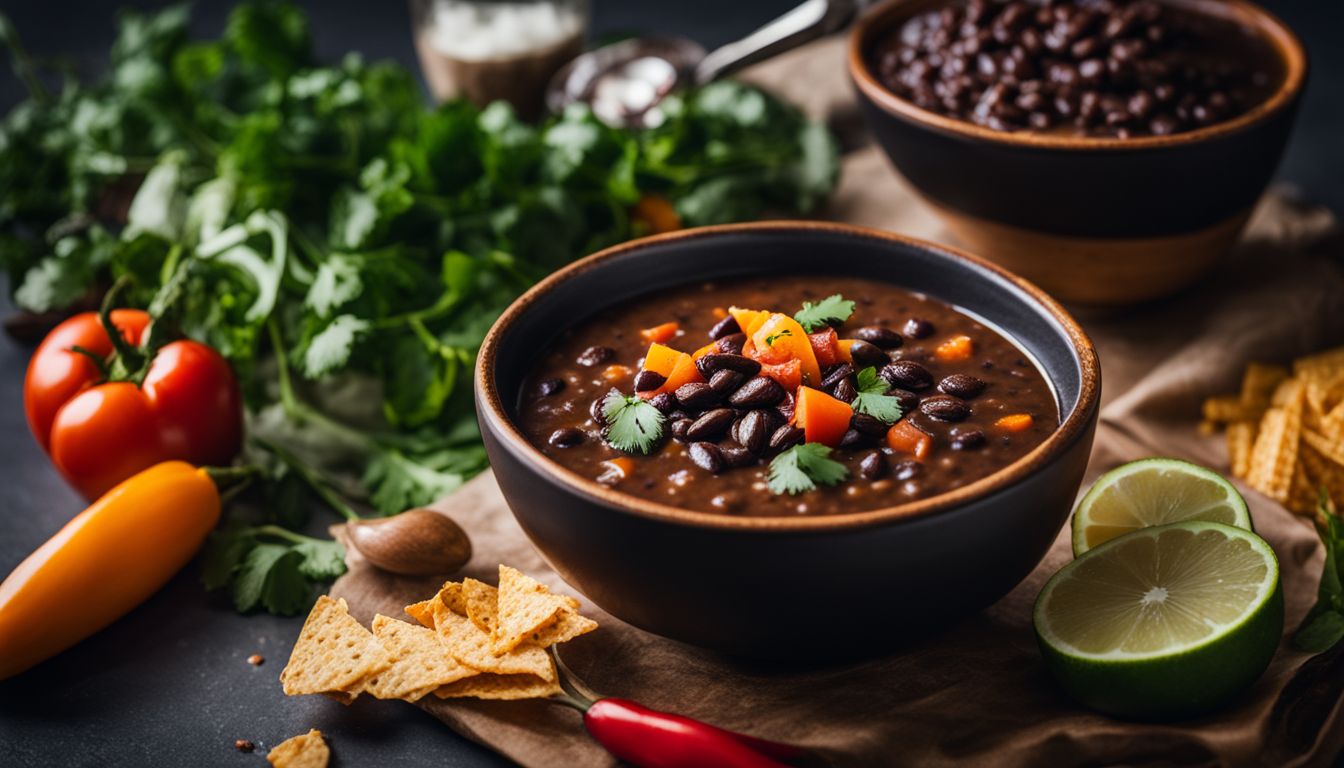
Packed with 15.24 grams of protein per cooked cup, black beans are a powerhouse for anyone looking to boost their protein intake. Their high-quality, easily digestible plant protein makes them an ideal choice not only for vegans and vegetarians but also for meat-eaters who want to diversify their protein sources.
Along with being cholesterol-free, these legumes offer a sustainable alternative to animal proteins without skimping on nutrition or taste.
The benefits don’t stop there; every serving dishes out essential minerals like iron and magnesium that your body needs to function optimally. With 7 grams of muscle-building protein in just 110 calories and zero fats per serving, incorporating black beans into meals can support weight management and help maintain lean body mass – crucial components of overall health and well-being.
Whether you’re aiming to shed pounds or build strength, making black beans a regular part of your diet is a smart move towards hitting those goals.
Fiber content

Black beans pack a powerful punch of dietary fiber, with about 15 grams in each cooked cup. This high-fiber content aids in digestion and can help prevent constipation. It’s also beneficial for heart health; eating plenty of fiber helps to lower blood cholesterol levels, which reduces the risk of heart disease.
Incorporating black beans into your diet might be an effective strategy for weight management as well. Fiber-rich foods like black beans keep you feeling full longer, curbing appetite and possibly helping with weight loss efforts.
Not only does the soluble fiber in black beans assist in stabilizing blood sugar levels, but it also plays a role in reducing the glycemic index of meals, making these legumes an excellent choice for people with diabetes or those looking to manage their blood sugar more effectively.
Vitamins and minerals
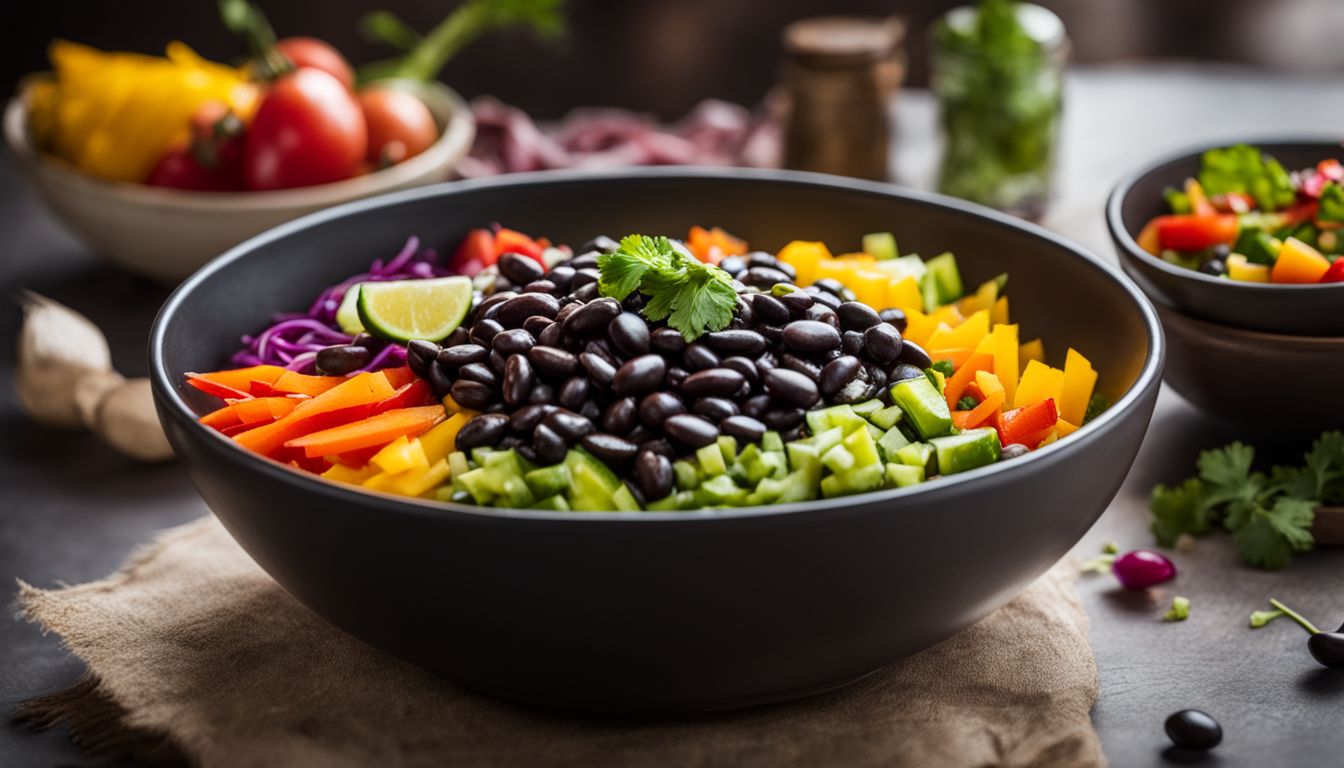
Packed with important vitamins and minerals, black beans are a nutritional powerhouse that can play a crucial role in maintaining good health. They deliver essential nutrients like iron for healthy blood and phosphorus to support strong bones, while magnesium aids in hundreds of biochemical reactions in the body.
Each serving provides a substantial dose of these valuable micronutrients that help keep our systems functioning optimally.
Besides being rich in B vitamins which are vital for energy production and brain function, they also contain zinc that bolsters the immune system. Black beans even offer folate, an important vitamin for pregnant women to support fetal development, and manganese, an often overlooked mineral necessary for metabolism and antioxidant defense.
With their high nutrient density, including black beans in your diet is an easy way to meet daily vitamin and mineral requirements without reaching for supplements.
Health Benefits of Black Beans
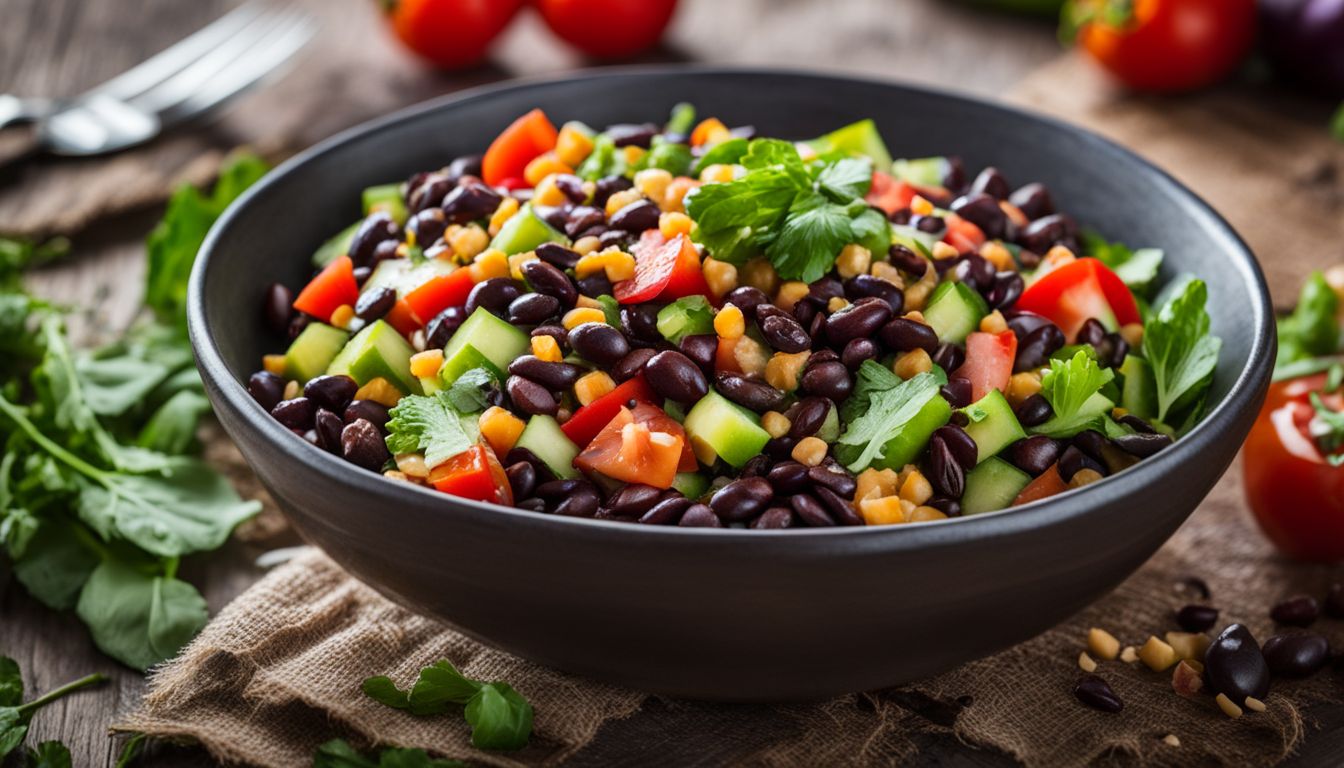
Black beans support bone health, boost the immune system, and help manage blood sugar levels.
Supports bone health

Black beans are a key player in promoting bone health due to their high content of essential nutrients. Loaded with calcium, magnesium, and phosphorus, they provide the necessary components for maintaining strong and healthy bones.
With 55 mg of calcium per serving, black beans contribute to bone density and strength, while the 180 mg of magnesium aids in the absorption of calcium into the bones. Furthermore, the phosphorus content supports the formation and maintenance of bone structure.
Consuming black beans regularly can play a vital role in preventing osteoporosis and ensuring overall skeletal well-being.
The rich mineral profile in black beans also includes manganese which has been linked to supporting healthy bone development. With its ability to enhance collagen production and promote efficient bone mineralization, manganese is another essential nutrient found abundantly in black beans.
Boosts immune system
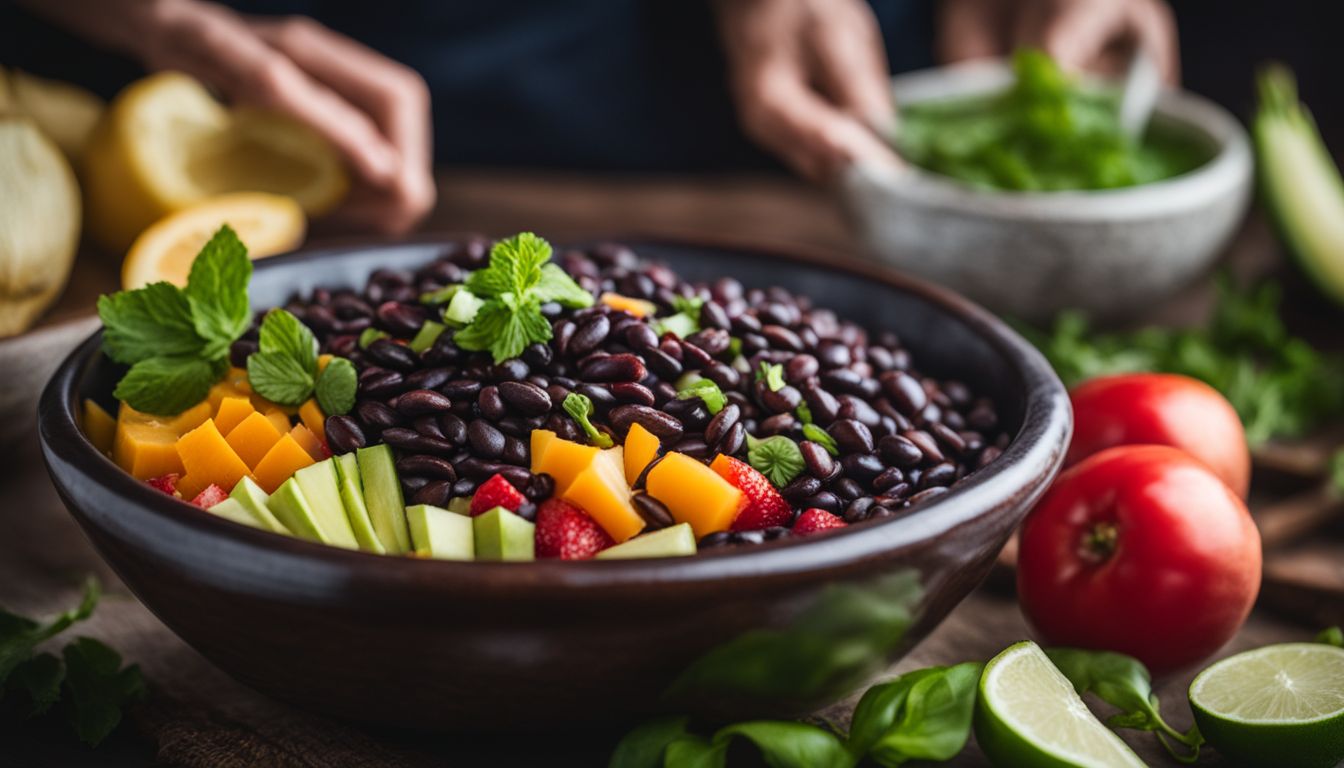
Black beans contain a variety of vitamins and minerals that contribute to a healthy immune system, including vitamin C, vitamin A, and zinc. Vitamin C is known for its role in supporting the immune system and helping the body fight off infections.
Additionally, black beans are high in antioxidants which can help reduce inflammation and support overall immune function. The combination of these nutrients makes black beans a beneficial addition to a diet aimed at maintaining a strong and robust immune system.
Helps manage blood sugar levels
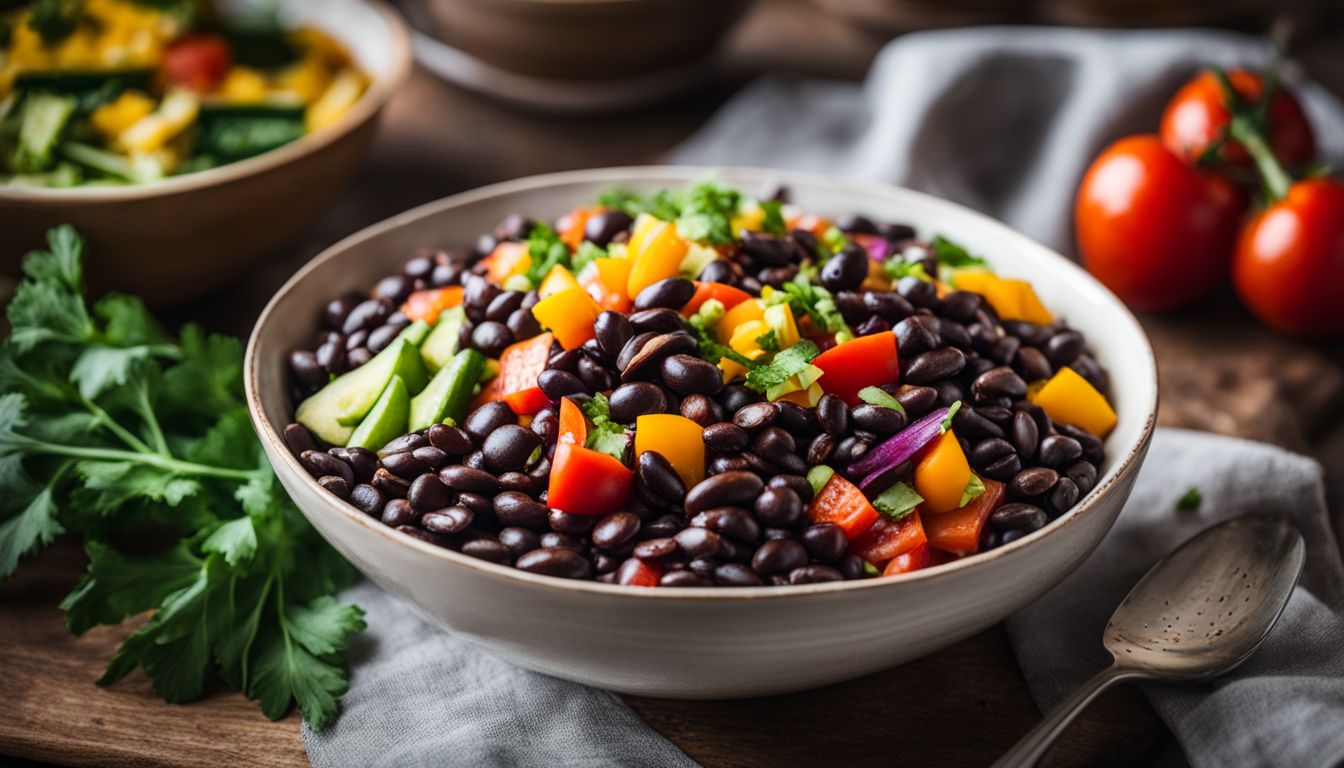
Black beans are beneficial for managing blood sugar levels due to their low glycemic index and high fiber content. The combination of protein and fiber in black beans helps slow down the absorption of sugars, preventing spikes in blood glucose levels.
Additionally, the presence of magnesium in black beans contributes to improved insulin sensitivity, which is essential for regulating blood sugar levels. Consuming black beans as part of a balanced diet can aid in maintaining stable blood sugar levels and may reduce the risk of developing type 2 diabetes.
Black beans contain an abundance of nutrients that support overall health, including vitamins, minerals, and antioxidants that contribute to better management of blood sugar levels.
Black Beans as a Protein Source for Sports Training
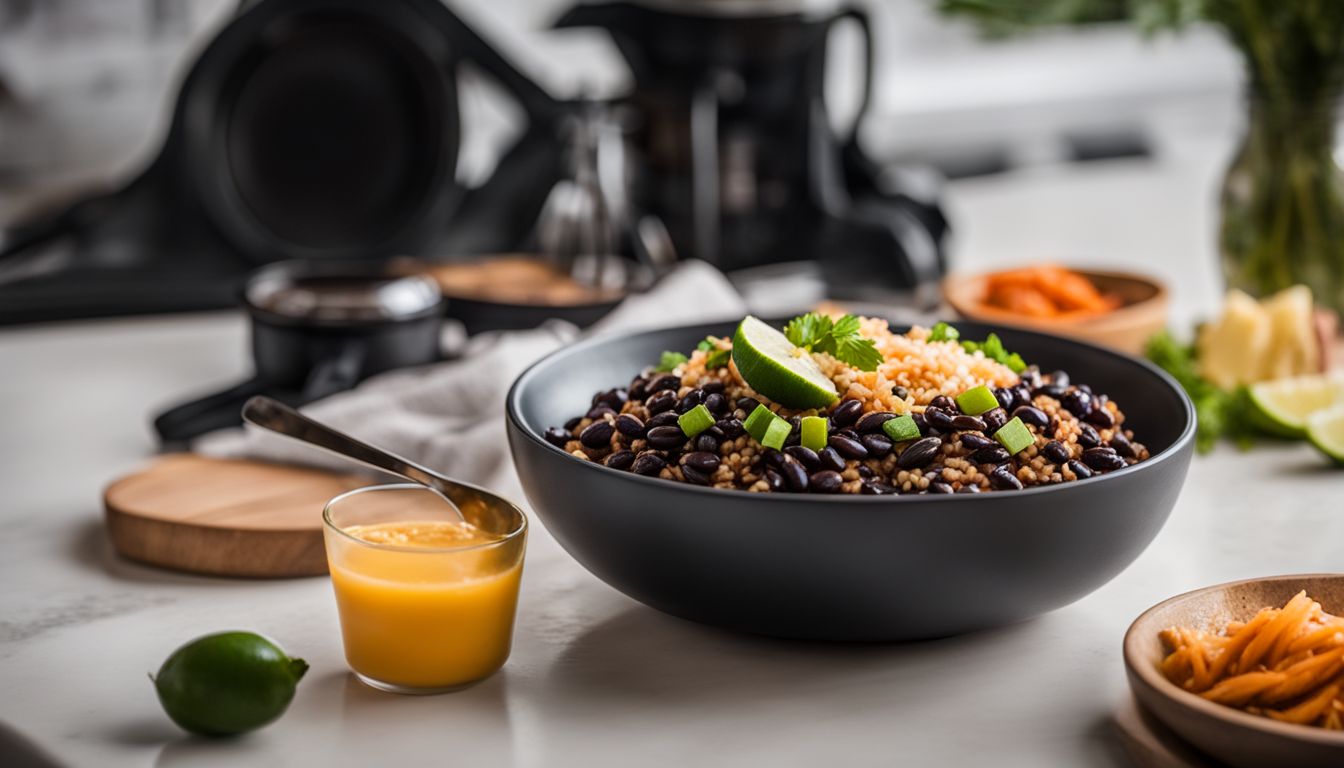
Black beans are high in protein and easily digestible, providing sustained energy and supporting muscle recovery and growth. Interested in learning more about the benefits of black beans for sports training? Keep reading to find out why they should be a part of your diet!
High protein and easily digestible
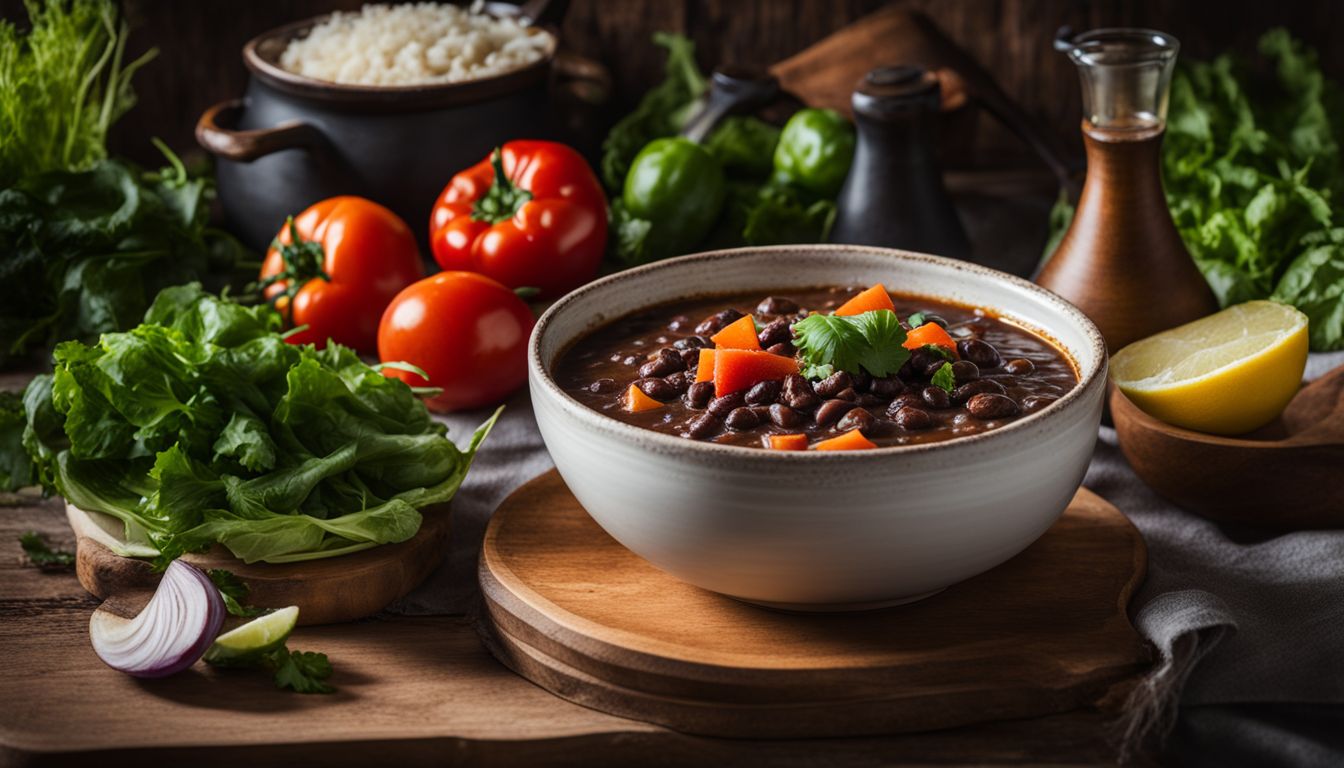
Black beans are an excellent source of protein, providing 15.24 grams per cooked cup. This makes them a valuable addition to any diet, especially for those seeking to increase their protein intake.
Additionally, the protein found in black beans is easily digestible, making it a convenient and efficient way to fuel the body with essential nutrients.
With their high protein content and easy digestibility, black beans can support muscle recovery and growth, making them ideal for individuals engaged in sports training or physical activities.
Provides sustained energy

Black beans are an excellent source of sustained energy due to their high protein and complex carbohydrate content. The combination of protein and fiber in black beans slows down the digestion process, providing a steady release of energy over an extended period.
This makes them a great option for supporting endurance during sports training or simply maintaining energy levels throughout the day.
In addition to being rich in slow-burning carbohydrates, black beans also contain essential nutrients such as iron, magnesium, and B vitamins which play crucial roles in energy metabolism.
Supports muscle recovery and growth

Black beans are a valuable protein source for supporting muscle recovery and growth. With 15.24 grams of protein per cooked cup, they aid in repairing and building muscle tissue after physical activity.
Additionally, black beans contain essential nutrients like iron, magnesium, and manganese which contribute to overall muscle health and function.
The high fiber content in black beans also supports muscle recovery by promoting better digestion and nutrient absorption. This aids in maintaining energy levels during workouts while enabling the body to efficiently utilize the protein for muscle repair and growth.
Preparing and Eating Black Beans

Cooking black beans from scratch is a cost-effective option and allows for more control over salt and other seasonings, while canned ones offer convenience and are ready to use in recipes.
Canned vs. dried beans
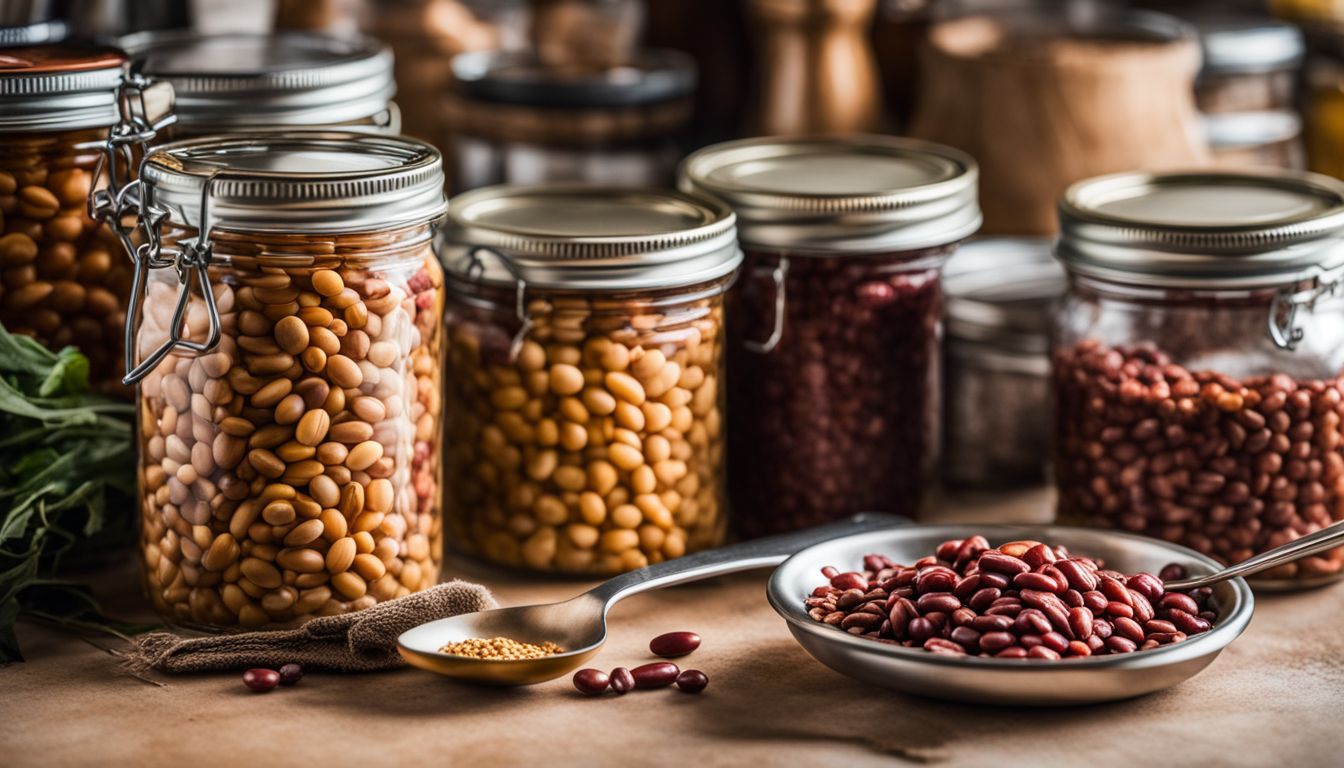
When deciding between canned and dried beans, consider that canned beans are convenient and quick to use. They’re pre-cooked and ready to eat, making them ideal for those short on time.
Canned beans also have a longer shelf life and can be stored for extended periods without losing their nutritional value. On the other hand, dried beans require soaking and cooking before consumption but offer more control over the texture of the final dish.
Additionally, they tend to be more cost-effective than their canned counterparts, making them an economical choice for budget-conscious individuals or families.
Dried beans also allow you to adjust the seasoning and salt content according to your preference while cooking. However, if convenience is a priority or if you need a quick protein boost in your meal preparation, then canned black beans are a viable option.
Easy recipe ideas

Black beans can be incorporated into a variety of delicious recipes for a nutritious and satisfying meal. Here are some easy recipe ideas to enjoy the benefits of black beans:
- Black Bean Salad: Combine black beans with fresh vegetables like bell peppers, tomatoes, corn, and avocado. Toss with a zesty lime vinaigrette for a refreshing and colorful salad.
- Black Bean Tacos: Fill soft or hard taco shells with seasoned black beans, shredded lettuce, diced tomatoes, and a dollop of guacamole for a quick and flavorful Mexican-inspired dish.
- Black Bean Soup: Simmer black beans with onions, garlic, vegetable broth, and spices like cumin and chili powder for a hearty and comforting soup.
- Black Bean Burgers: Mash cooked black beans with breadcrumbs, chopped onions, and seasonings to form patties that can be grilled or pan-fried for a tasty vegetarian burger option.
- Black Bean Dip: Blend black beans with fresh cilantro, lime juice, and spices to create a flavorful dip perfect for pairing with crunchy tortilla chips or fresh cut vegetables.
- Black Bean Stuffed Sweet Potatoes: Bake sweet potatoes until tender, then fill them with seasoned black beans and top with a dollop of Greek yogurt or salsa for a satisfying meal.
- Black Bean Quesadillas: Layer black beans between tortillas along with cheese, sautéed onions, and peppers before pan-frying until crispy for a simple yet delicious meal or snack option.
Conclusion
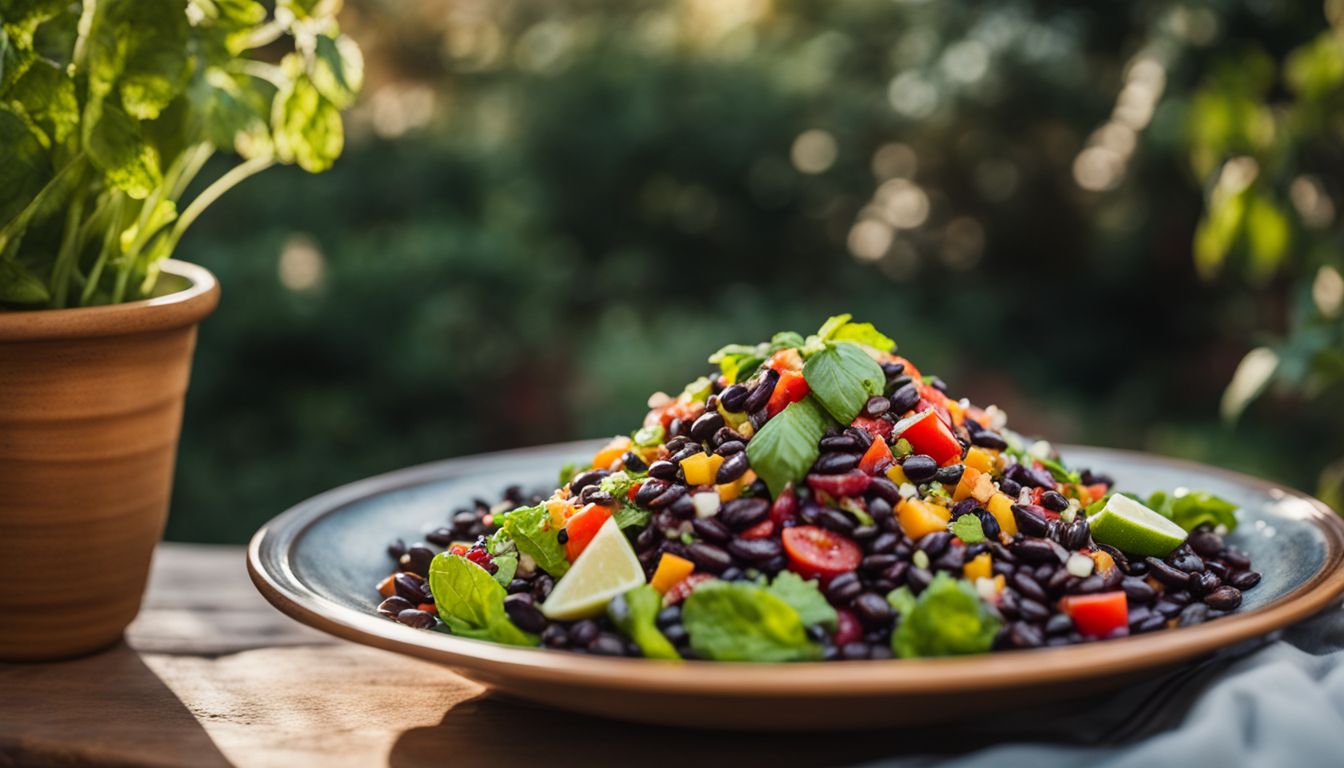
In conclusion, black beans are a nutritious and versatile source of protein that can be easily incorporated into a healthy diet. With their high protein and fiber content, as well as an array of essential vitamins and minerals, black beans offer practical and efficient benefits for overall wellness.
By regularly consuming black beans, individuals can make significant improvements to their nutritional intake while supporting bone health, boosting the immune system, managing blood sugar levels, and providing sustained energy for sports training.
To explore further resources or recipes using black beans, readers can look into easy recipe ideas or additional guidance on preparing and including this beneficial legume in their meals.
Embracing the goodness of black beans in your diet is an impactful step towards nurturing overall wellbeing.
FAQs
1. Can eating black beans help me get enough protein?
Yes, black beans are a good source of protein and can be an important part of your diet to help you meet your daily protein needs.
2. Do black beans offer other health benefits besides being high in protein?
Absolutely! Black beans are packed with fiber, vitamins like vitamin K, and minerals such as selenium which aid in lowering the risk of heart problems and managing diabetes.
3. Are black beans better for my heart compared to other foods?
Black beans contain anthocyanins and flavonoids that can improve blood lipid profiles and reduce cardiovascular risk, making them a heart-healthy choice.
4. How do black beans fit into a weight loss plan?
With their high-fiber content and low glycemic index (GI), black beans can help you feel full longer while assisting in controlling blood sugar levels, supporting weight management efforts including those aimed at obesity reduction.
5. Could I eat just black beans for all my protein needs?
While they’re nutritious, it’s best to combine them with other sources of protein like lentils or chickpeas because no single food has all the amino acids your body requires.
6. What should I be aware of before adding lots of black beans to my meals?
Although beneficial, you should consume them in moderation due to antinutrients they contain; also remember to balance out their intake with iron-rich foods if concerned about iron deficiency.
Sources referenced in this article
- https://www.healthline.com/nutrition/are-black-beans-healthy
- https://www.medicalnewstoday.com/articles/289934
- https://www.webmd.com/diet/health-benefits-black-beans
- https://www.eatingwell.com/article/7899240/are-black-beans-healthy-heres-what-a-dietitian-says/
- https://www.verywellfit.com/black-beans-nutrition-facts-calories-and-their-health-benefits-4118125
- https://www.phlabs.com/the-benefits-of-black-beans-will-blow-you-away
- https://www.prevention.com/food-nutrition/healthy-eating/a41626785/are-black-beans-healthy/

Author
Years ago, the spark of my life’s passion ignited in my mind the moment I stepped into the local gym for the first time. The inaugural bead of perspiration, the initial endeavor, the very first surge of endorphins, and a sense of pride that washed over me post-workout marked the beginning of my deep-seated interest in strength sports, fitness, and sports nutrition. This very curiosity blossomed rapidly into a profound fascination, propelling me to earn a Master’s degree in Physical Education from the Academy of Physical Education in Krakow, followed by a Sports Manager diploma from the Jagiellonian University. My journey of growth led me to gain more specialized qualifications, such as being a certified personal trainer with a focus on sports dietetics, a lifeguard, and an instructor for wellness and corrective gymnastics. Theoretical knowledge paired seamlessly with practical experience, reinforcing my belief that the transformation of individuals under my guidance was also a reflection of my personal growth. This belief holds true even today. Each day, I strive to push the boundaries and explore new realms. These realms gently elevate me to greater heights. The unique combination of passion for my field and the continuous quest for growth fuels my drive to break new ground.




